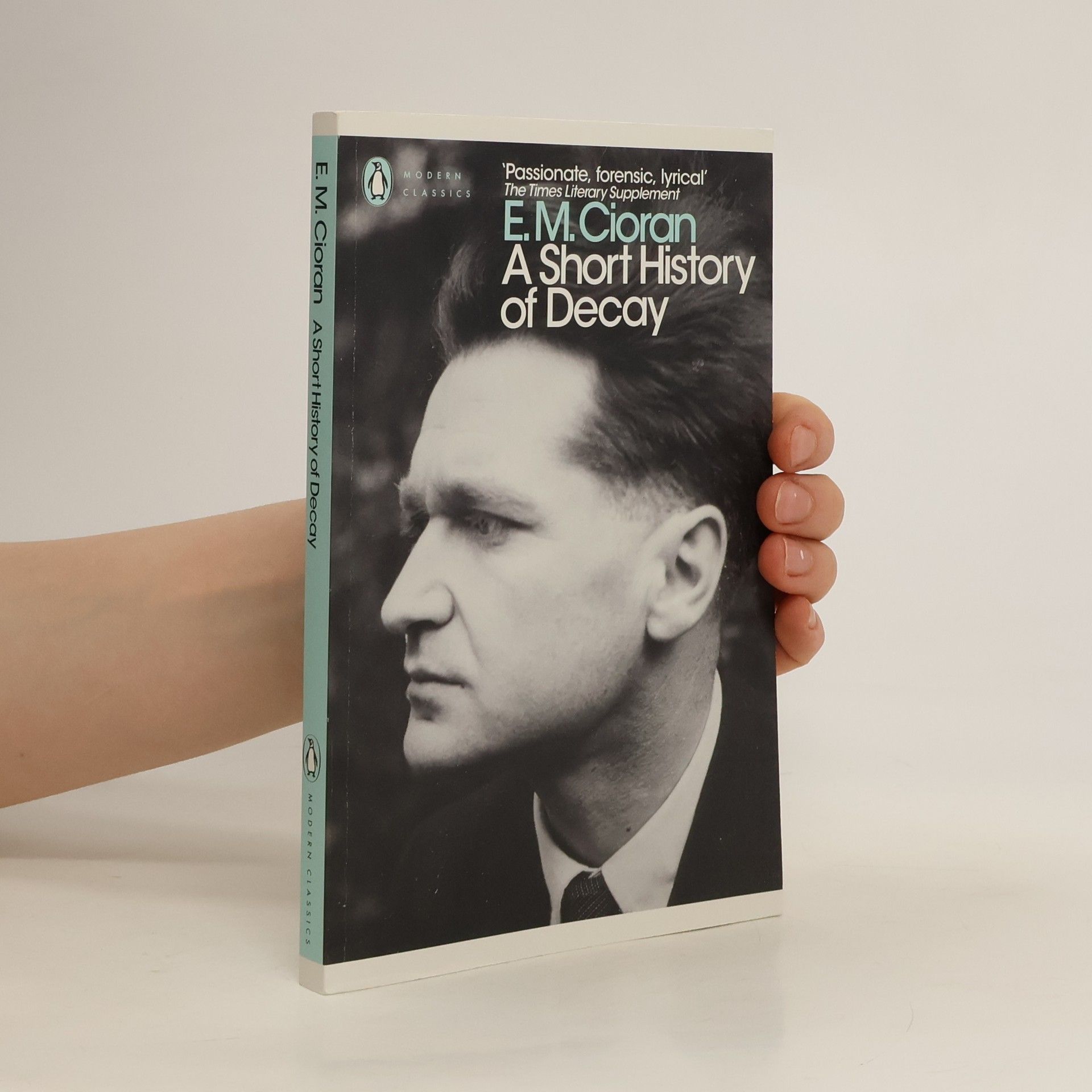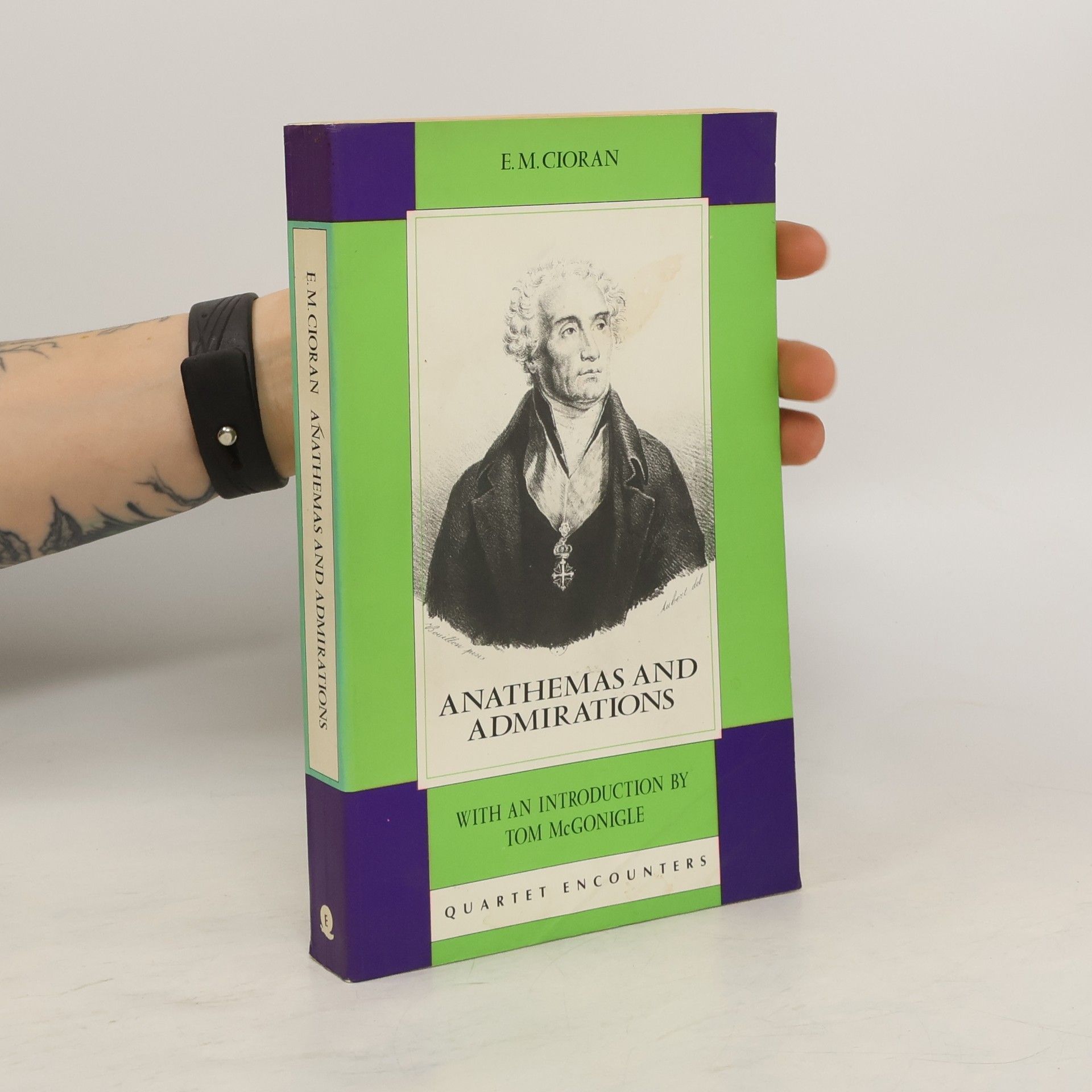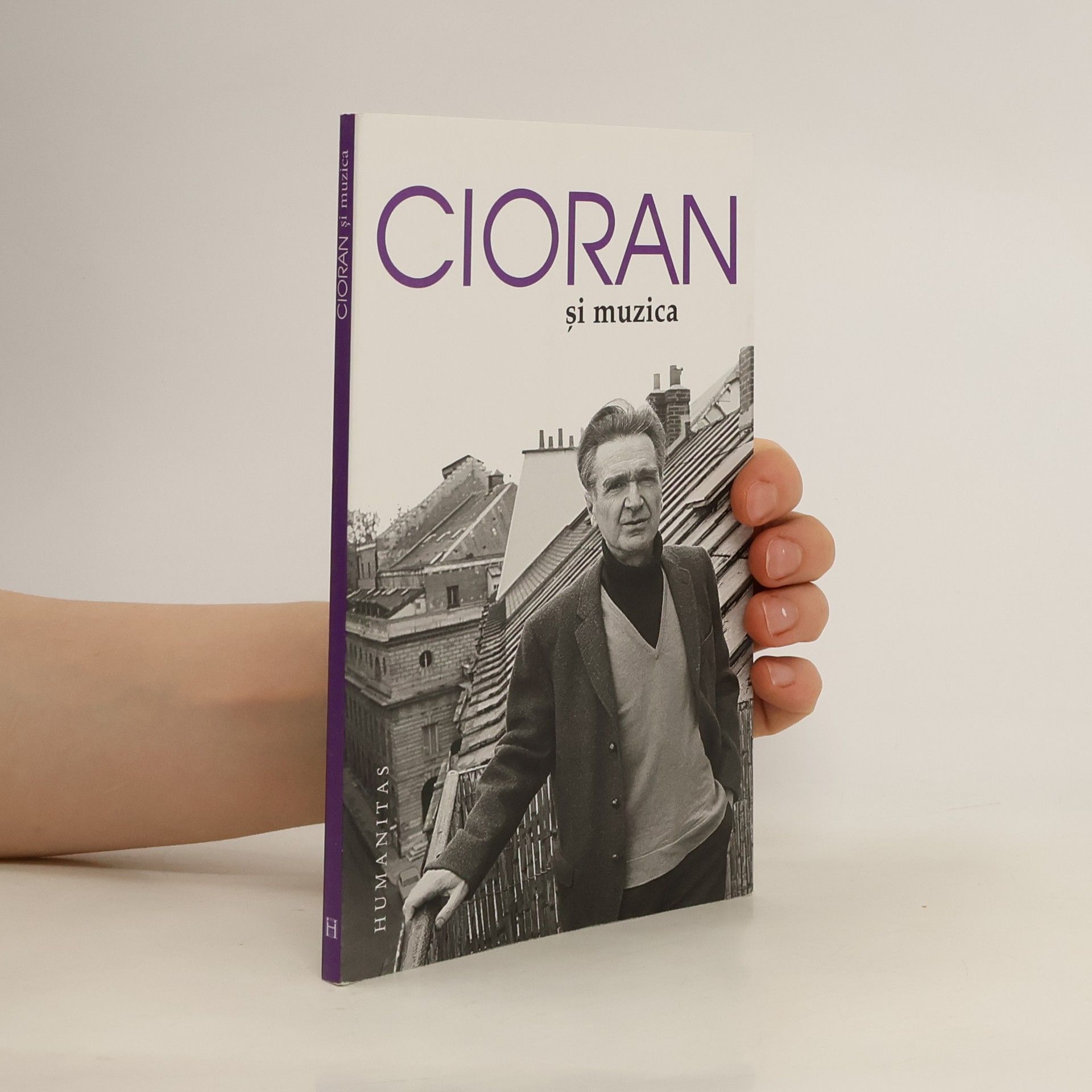Emil Cioran Book order (chronological)
Emil Cioran is renowned for his aphoristic and essayistic explorations of profound existential themes like despair, solitude, and the nature of history, often delving into metaphysical territories. Initially writing in Romanian, his early work featured lyrical meditations influenced by German Romantics and philosophers such as Nietzsche and Schopenhauer. Upon relocating to Paris, he adopted French, viewing it as a rigorous, almost constricting form that helped temper his excesses and enhance his philosophical precision. His subsequent French writings, characterized by a classical style, continued to dissect his persistent obsessions with increasing detachment, earning him recognition for his intellectual subversion and ironic, albeit bitter, humanism.







Ćwiczenia z podziwu
- 258 pages
- 10 hours of reading
Emil Cioran (1911–1995), światowej sławy rumuńsko-francuski filozof, mizantrop i sceptyk paradoksalnie kochający życie właśnie za jego (jak uważał) brak sensu, w tym tomie daje wyraz podziwowi dla twórczości autorów, którzy go po części ukształtowali. Eseje o nich i krótkie ich portrety powstawały przez prawie trzydzieści lat, aż zostały zebrane w całość wydaną w 1986 roku. Tom zawiera czternaście tekstów o innych i dwa o samym autorze. De Maistre, Valéry, Beckett, Saint-John Perse, Eliade, Caillois, Borges i inni są okazją do „ćwiczenia się” w podziwie – bo mizantropowi i sceptykowi nie przychodzi on łatwo. Nie są to oczywiście „monografie” tych twórców, lecz okazje do wypowiedzenia własnych myśli jak ta, że „nie ma podstaw, by uznawać dobro za najwyższy atrybut boskości”. Dekonstruując wszakże de Maistre’a, Cioran konkluduje, że myśl jego idola jest „żywa o tyle, o ile budzi nasz wstręt i zbija z tropu”. Przewrotność tego podziwu uwidacznia się też w opinii o Valérym: „Być zrozumianym za życia to prawdziwe nieszczęście dla pisarza. Valéry był rozumiany już za życia”. Ćwiczenia z podziwu, przy którym gimnastykuje się autor tego tomu, będą więc wyzwaniem także dla intelektualnej kondycji czytelnika, zwłaszcza gdy natrafi on na zdania negujące jego trud podziwiania: „pisarz to ktoś niespełna rozumu, kto leczy się fikcją słów”, a „pisanie jest ułomnością”. Zajęcia na Cioranowskiej siłowni nie są łatwe.
Rozmowy
- 374 pages
- 14 hours of reading
Opublikowany w roku śmierci francusko-rumuńskiego filozofa Emila Ciorana (19111995) tom wywiadów z nim stanowi bardzo szczególną publikację. Na początku lat 70. XX wieku Cioran pisał do znajomego: Mam sześćdziesiąt lat i nigdy nie występowałem publicznie. Nie cenił życia literackiego, nie przyjmował nagród, a swoje pisarstwo uważał za terapeutyczne. Żył paradoksalnie: uznawał życie za bezsensowne, lecz je kochał i cieszył się nim. W późniejszym okresie jednak, w miarę rosnącej sławy, zaczął udzielać wywiadów, czasem nawet rozmowy z nim odbywały się przed zgromadzoną publicznością. Niniejszy zbiór zawiera dwadzieścia takich wywiadów i rozmów z Cioranem z ostatniego ćwierćwiecza jego życia, głównie z lat osiemdziesiątych XX wieku. Mówi on o sobie i swoim stosunku do świata, opowiada o dzieciństwie, młodości i powodach, dla których, osiadłszy na stałe we Francji, w latach 40. porzucił ostatecznie język rumuński i zaczął pisać po francusku. Wiele miejsca w rozmowach zajmują kwestie egzystencjalne: sens (bezsens) życia, a zarazem czerpanie z niego, samobójstwo, religia, Bóg. Wywiady powstały przy różnych okazjach, rozmaici byli rozmówcy i dlatego mamy tu całą gamę tematów, a także zróżnicowaną głębię refleksji. Niektóre wątki powtarzają się, oświetlane zarazem z różnych perspektyw. Dzięki temu czytelnik otrzymuje wielostronny obraz osobowości filozofa poświadczony przez niego samego.
Zmierzch wszelkiej myśli
- 268 pages
- 10 hours of reading
Emil Cioran (1911–1995), rumuński filozof, osiadłszy na resztę życia w Paryżu już pod koniec lat trzydziestych XX wieku, został ostatecznie francuskim intelektualistą i w okresie wczesnopowojennym zdecydował się pisać wyłącznie po francusku. Niniejsza książka powstała jeszcze w języku rumuńskim w 1940, a w przekładzie na francuski (Le Crépuscule des pensées) ukazała się w 1991 roku. Ze względu na wysoce niezadowalający przekład na język francuski niniejsze wydanie jest tłumaczeniem z oryginału rumuńskiego Amurgul gîndurilor. Poprzednia polska wersja, pod mylącym tytułem Zmierzch myśli (zmierzch nie myśli, lecz zapada), z konieczności powtarza niedostatki podstawy francuskiej. Ponadto tytułowe słowo „myśli” ma oznaczać drugą osobę l. mn. „Na początku był Zmierzch”, pisze Cioran – śladem starożytnych, dla których umieranie zaczyna się wraz z chwilą narodzin – w tym zbiorze bardzo poetyckich aforyzmów i przemyśleń pełnych miłości do życia, symbolizowanego przez różę, i poszukiwania sensu (motyw krzyża) w bezsensownym z założenia wszechświecie. Ten paradoks – ta sprzeczność – przenika całe dzieło Ciorana, a najdobitniej we wczesnej fazie jego twórczości. Duch to „materia wydźwignięta do stanu cierpienia”. Róża życia zakwita chorobą, chcemy usłyszeć zapach róży, bo duszę „stwarza nam muzyka”. Po tych bezdrożach anestezji krąży nocami młody Cioran cierpiący na bezsenność – i na życie.
Samotność i przeznaczenie
- 454 pages
- 16 hours of reading
Księga złudzeń
- 260 pages
- 10 hours of reading
To druga książka Emila Ciorana, rumuńsko-francuskiego pisarza i filozofa (1911-1995), napisana po rumuńsku i wydana w Bukareszcie (1936), dzieło 25-latka, który dwa lata wcześniej opublikował swój słynny debiut Na szczytach rozpaczy, a w 1937 roku dzieło nie mniej słynne ze względu na skandal, jaki wywołało, Święci i łzy (Wydawnictwo Aletheia, Warszawa 2008 i 2017). W tym czasie autor był nauczycielem licealnym w Braszowie. Rok później wyjechał na stypendium do Francji, gdzie osiadł na stałe. Po II wojnie światowej pisał już tylko po francusku. Zmianie języka towarzyszyła też zmiana stylu, a Księga złudzeń jest przykładem wczesnej poetyki, potem już rzadszej w dziele Ciorana. Niniejszy tom cechuje niezwykła intensywność emocji i bogactwo form: od modlitwy przez poetycki esej lub może eseistyczną poezję prozą po precyzyjny aforyzm, tak charakterystyczny dla jego późniejszej twórczości. Również tonacja całości jest niezwykle zróżnicowana: od ironii po patos. Tematyka skupia się wokół kwestii wiary, mistyki, świętości, cierpienia i życia. Księga złudzeń orientuje się jeszcze na sprawy filozofii, którą autor studiował wcześniej na uniwersytecie w Bukareszcie i której w jednym z ponad 20 tekstów składających się na Księgę, zatytułowanym Skończyć z filozofią, wypowiada posłuszeństwo. Zarazem buduje własną filozofię, bardzo złożoną i trudno uchwytną: mistyczną, pesymistyczną, a przy tym afirmującą życie, paradoksalną i buntowniczą.
Notizen 1957-1972
- 1021 pages
- 36 hours of reading
„Wer ist wie er? ... ein verzweifelter Privatnachdenker, der mit der Komik seiner Lage spielt ... Nur eines läßt der ins Scheitern verliebte Schriftsteller gelten: seine Notizen – ‚Ich werde mich an diese Cahiers klammern, denn sie sind der einzige Kontakt, den ich mit dem Schreiben habe.‘“ Hennning Ritter, Frankfurter Allgemeine Zeitung . „Was im autorisierten Werk nur anspielungshaft ausgedrückt ist, kann man nun namentlich identifi zieren... Die... nunmehr vollstän- dige Übersetzung der Notizen ist eine bedeutende verlegerische Leistung.“ Jürgen Große, Information Philosophie „Ohne Übertreibung läßt sich sagen, daß einem in diesem Band der eloquenteste Misantthrop des 20. Jahrhunderts begegnet.“ Roderich Schmitz, Junge Freiheit „Wortgewaltiger hat wohl niemand vor ihm die Verzweifl ung un- seres Seins beschrieben ...“ Peter Kampits, Wiener Zeitung
Pensées étranglées
- 86 pages
- 4 hours of reading
"Premier devoir, au lever : rougir de soi". "Je rêve d’une langue dont les mots, comme des poings, fracasseraient les mâchoires". "Frivole et décousu, amateur en tout, je n’aurai connu au fond que l’inconvénient d’être né". "Rien ne pourra m’ôter de l’esprit que ce monde est le fruit d’un dieux ténébreux dont je prolonge l’ombre et qu’il m’appartient d’épuiser les conséquences de la malédiction suspendue sur lui et sur son œuvre". Dans cet essai, Cioran réfléchit sur l’impossible conciliation entre l’idée de Dieu et l’omniprésence du mal. Malgré des pages très sombres, il conclut pourtant : "Nous sommes au fond d’un enfer dont chaque instant est un miracle". Une pensée d’une exigence radicale, entre désespoir absolu et humour ravageur. Ces deux textes sont issus de l’essai intitulé "Le Mauvais Démiurge" (NRF essais, 1969).
Was Cioran-Leser und Rezensenten in den letzten Jahren – nach Ciorans Tod und nach der Veröffentlichung fast aller Werke auf deutsch – vor allem interessierte, war der braune Fleck auf der weißen Weste des berühmten Skeptikers. Die Deutschlandartikel aus den dreißiger Jahren des 20. Jahrhunderts zeigen ihn vor. Voll vitalistischer Emphase stürzt sich der jugendliche Autor auf deutschen Irrationalismus und nazistische »Revolution«. Er wünscht seinem Land eine Diktatur nach Hitlers Vorbild an den Hals. Nur so, argumentiert er, könne Rumänien aus Lethargie und geschichtlichem Abseits herausgerissen werden und sich Gestalt, Zukunft, ein Schicksal erobern. Von 1933 bis 1935 hält Cioran sich zu Studienzwecken in Berlin, München und Dresden auf. Bei aller Begeisterung für den Nationalsozialismus beschränkt er sich auf die Rolle des geschichtsphilosophisch interessierten Zuschauers. Borniertheit, Willkür, Gewalt und die Anzeichen dafür, daß alles ein böses Ende nehmen könnte, bleiben ihm nicht verborgen.

